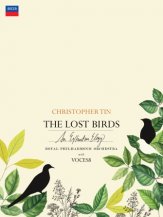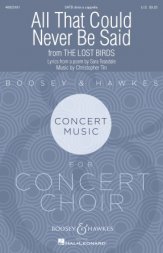The Lost Birds by Christopher Tin Friday, January 26, 2024
The Lost Birds: An Extinction Elegy by Christopher Tin
“The Lost Birds” is a musical memorial to bird species driven to extinction by humankind. Sweeping and elegiac, it’s a haunting tribute to those soaring flocks that once filled our skies, but whose songs have since been silenced. It’s a celebration of their feathered beauty: their symbolism as messengers of hope, peace, and renewal. But it’s also a warning about our own tenuous existence on the planet: that the fate that befell these once soaring flocks foreshadows our own extinction.
Individual movements available separately:
The Saddest Noise by Christopher Tin, SATB divisi a cappella
“The Saddest Noise” is a setting of Emily Dickinson’s poem “The Saddest Noise, the Sweetest Noise.” It begins the story of “The Lost Birds” in spring: the season of birth and renewal, and a time of year when bird songs flood the skies. But what is ordinarily a joyous sound is now riddled with sorrow, as the songs of the remaining birds remind us of the ones we’ve already lost.
Wild Swans by Christopher Tin, SATB divisi a cappella
“Wild Swans,” a setting of a poem by Edna St. Vincent Millay, ends the first half of “The Lost Birds.” Told from the point of view of the poet, it starts with the sound of bird cries: gradually approaching from a distance, until they pass overhead, triggering feelings of longing. After an instrumental interlude, and the narrator’s impassioned declaration of freedom, the song ends as it started – with the cries of wild swans receding into the distance, foreshadowing their demise.
All That Could Never Be Said by Christopher Tin, SATB divisi a cappella
With a simple melody inspired by children’s songs, “All That Could Never Be Said” is a setting of Sara Teasdale’s poem “In the End.” Showcasing her signature pairing of nihilism and pastoral beauty, the poem is an exploration of regret: it suggests that the consequences of our inaction are final and absolute. There are no second chances to speak up or to act, and all our missed opportunities will be lost to us until we’re reunited with them in death.
I Shall Not See the Shadows by Christopher Tin, SATB divisi with piano
“I Shall Not See the Shadows” is based on Christina Rossetti’s poem “When I Am Dead My Dearest.” It portrays death at its most indifferent – unnoticed, unheralded, unremembered. It also suggests that forgetting is a form of extinction, too – that the finality of species lies not in the death of its last remaining members, but in the failure to preserve their memory.
Hope Is the Thing with Feathers by Christopher Tin, SSATBB a cappella
Emily Dickinson’s poem on the fragility of nature, as well as our own hand in its destruction, finds a elegiac tone in this original piece from “Baba Yetu” composer Christopher Tin. Palo Alto High School, Tin’s alma mater, commissioned this deeply melodic composition in celebration of their centennial in 2018.
Shop Stanton’s for all your sheet music needs!

